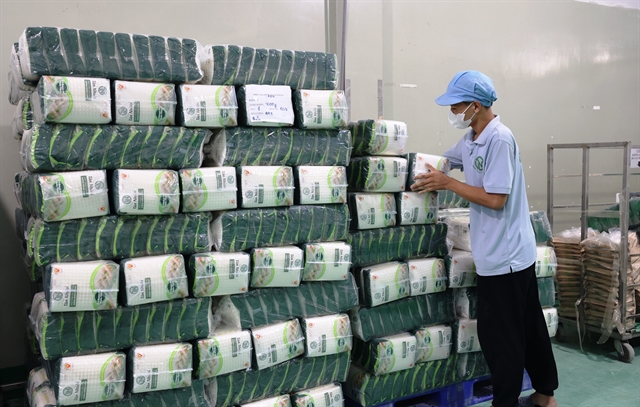 Economy
Economy


|
| Super-thin rice paper made by the Tân Nhiên Company Limited, Tây Ninh Province, a five-star OCOP product, is packaged for distribution in both domestic and international markets. — VNA/VNS Photo |
HÀ NỘI — The National Council for the Evaluation of OCOP Products on Tuesday announced the recognition of 47 new five-star-rated products under the One Commune One Product (OCOP) programme, bringing the national total to 126 five-star products.
According to the Ministry of Agriculture and Environment (MAE), Việt Nam now boasts over 16,000 OCOP-certified products, more than three times the number recorded in 2020.
Despite this impressive growth, fewer than 0.5 per cent of OCOP products have attained the prestigious five-star rating—a distinction awarded only to the highest-quality, most authentic offerings.
MAE Deputy Minister Trần Thanh Nam said the OCOP programme is more than just a tool to boost agricultural consumption. It serves as a critical platform for small-scale households, cooperatives, and traditional artisans to build brands and expand their reach to both domestic and international markets.
He underscored that the programme is being implemented with a commitment to quality over quantity.
“We are not chasing numbers or following trends. Our goal is to cultivate distinctive, high-value products that reflect the identity and spirit of their homeland,” he said.
The Deputy Minister emphasised the importance of packaging, describing it as a product’s first impression. Thoughtful design, he noted, can evoke a strong sense of place—especially for those far from home.
He likened the OCOP movement to a quiet yet steady current of local specialties—certified, traceable, and rich in cultural value.
According to the Deputy Minister, this current originates in rural villages, rooted in traditional craftsmanship, and is gradually flowing into broader domestic and international markets.
To ensure transparency and fairness, he called for strict, objective evaluation standards—particularly in light of the recent reorganisation of the National OCOP Council.
“Each star awarded must be well-deserved—it serves not only as official recognition but also as a passport to the market,” he said.
In an era of growing consumer demand for authenticity and traceability, OCOP products distinguish themselves through their verified origin, standardised packaging, and strong regional character.
“This is a subtle yet powerful competitive edge that not every product can claim,” he added.
The programme not only boosts rural incomes but also serves as a catalyst for transforming cultural values into economic assets, laying a solid foundation for the next phase of the national target programme on new rural development.
Nam reaffirmed the ministry’s commitment to elevating OCOP products, expressing hope that more of them will secure a strong presence in international markets.
He also underscored the key objectives set forth by the Prime Minister, which include developing stable raw material zones, fostering the involvement of businesses and cooperatives, applying science and technology, building strong brands, and ensuring accessible credit for producers.
Between November 2024 and April 2025, the council received 82 product submissions, primarily comprising food items, along with handicrafts, medicinal products, and one community-based tourism service—all showcasing strong local identity.
A total of 20 provinces and cities participated in the evaluation process, including first-time contributors such as Bạc Liêu, Quảng Bình, Yên Bái, Tuyên Quang, and Bình Định. Many of the submissions reflected regional strengths and the presence of centralised raw material zones, underscoring the OCOP programme’s role in fostering rural culture and creativity. — VNS




